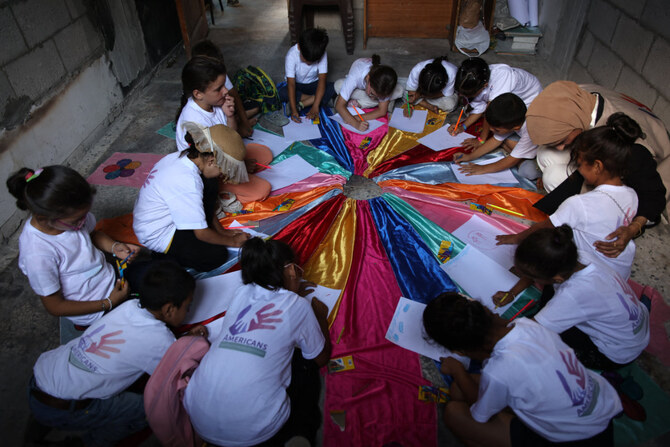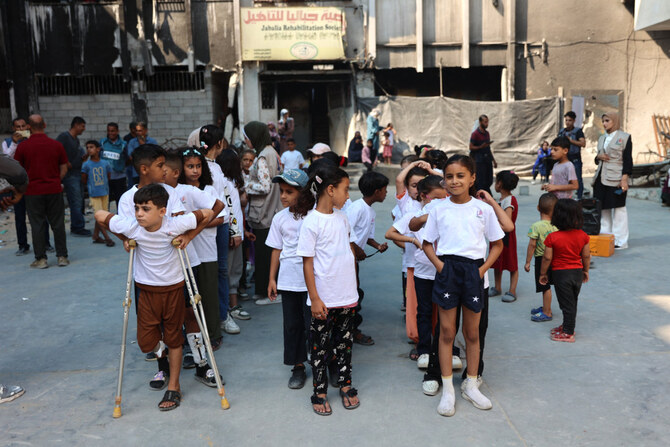LONDON: Terrorized, grieving, starved, and homeless, thousands of unaccompanied children in the war-ravaged Gaza Strip are enduring unimaginable horrors amid a dire humanitarian crisis — all without the care and protection of a parent or guardian.
UN Women estimated in April that Israel’s military operation in Gaza, which began on Oct. 7 in retaliation for the Hamas-led attack on southern Israel, had left at least 19,000 children without one or both parents.
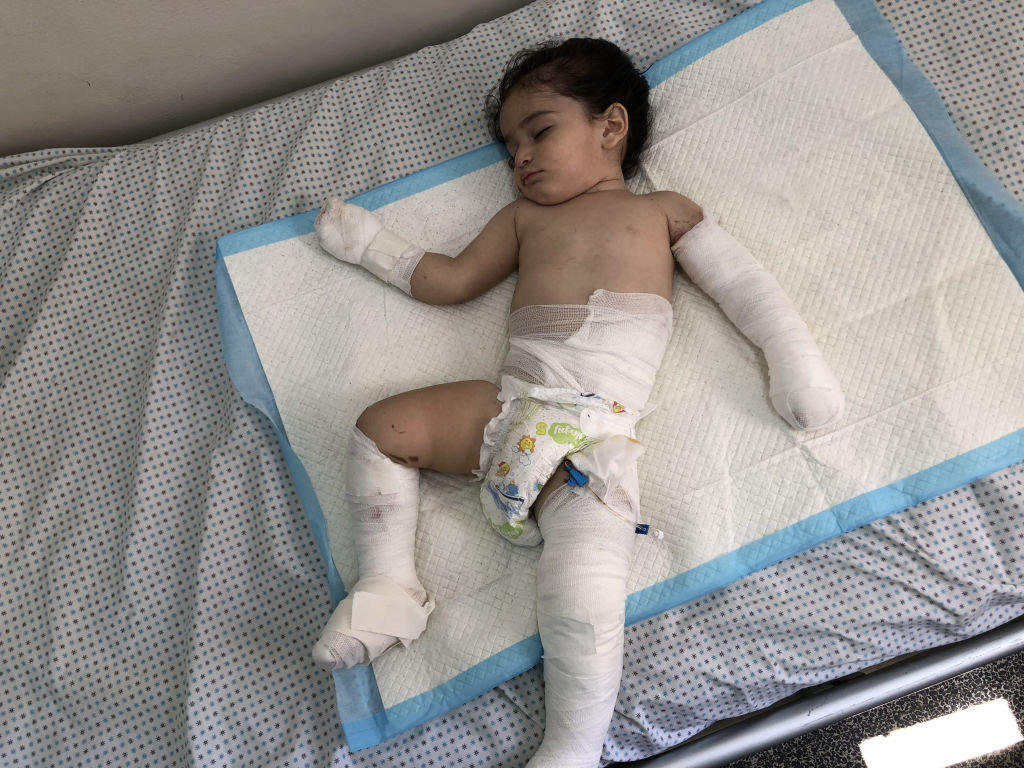
Baby boy Omar Al-Qadiri, who lost his family in the Israeli attack on the Et-Tabiin School in Gaza City, is treated at Kemal Adwan Hospital in Beit Lahia, Gaza, on Aug. 19, 2024. (Anadolu via Getty Images)
The UK-based charity Oxfam has described the war in Gaza as “one of the deadliest conflicts of the 21st century,” with a death toll now in excess of 40,170 — among them at least 25,000 women and children, according to Gaza’s health authority.
In February, the UN children’s fund, UNICEF, declared the Gaza Strip “the most dangerous place in the world to be a child.”
Children in Gaza have suffered life-changing injuries under Israel’s bombardment. Many lack access to medical care and suffer malnutrition, psychological distress, and infectious diseases, including polio, hepatitis A, and various skin conditions
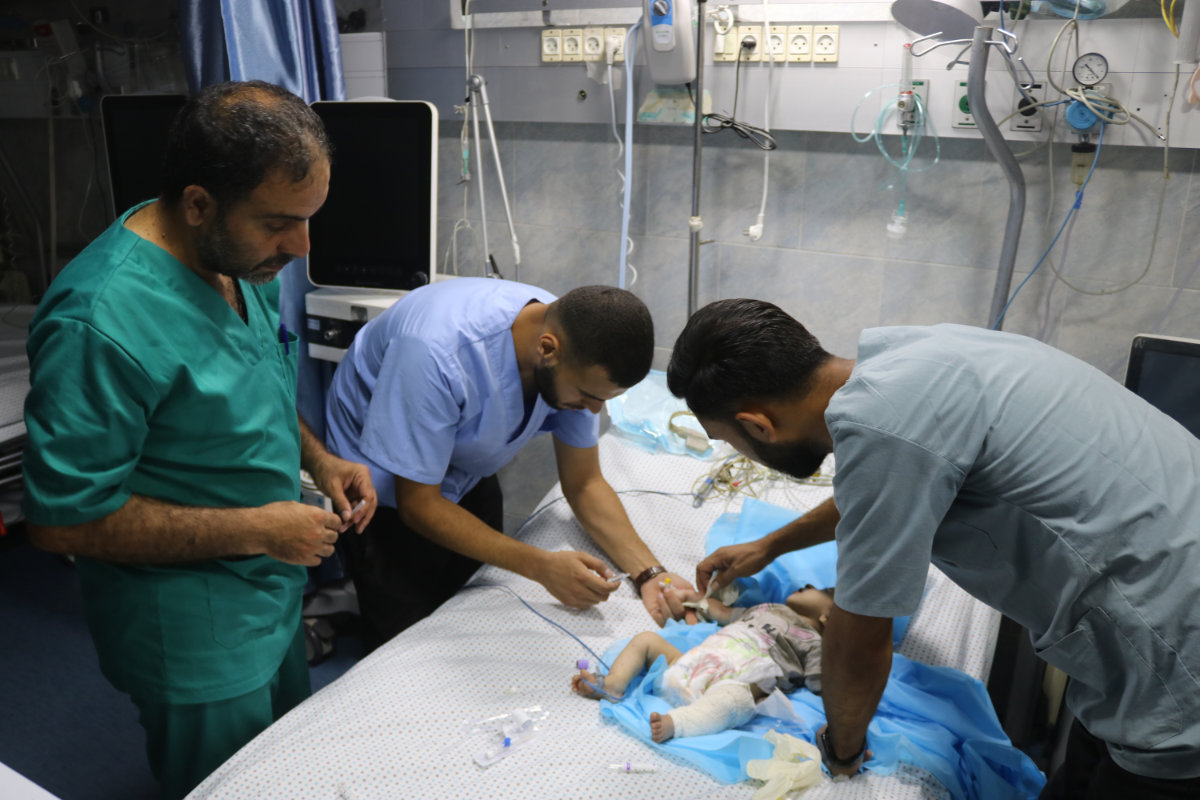
BabyAsmaa Ajour, who lost her entire family in an Israeli army attack on Saraya crossroads, is treated for injuries at Kamal Adwan Hospital in Beit Lahia, Gaza. (Anadolu via Getty Images)
UNICEF said in June that one in three children in Gaza is acutely malnourished, warning that at least 3,000 of them in the enclave’s south are at risk of dying from starvation.
“Horrific images continue to emerge from Gaza of children dying before their families’ eyes due to the continued lack of food, nutrition supplies, and the destruction of healthcare services,” Adele Khodr, UNICEF regional director for the Middle East and North Africa, said in a statement.
She described the situation as a “senseless, man-made deprivation.”
Meanwhile, the New York-based monitor Human Rights Watch accused the Israeli government of starving civilians as a “method of warfare” — claims the Israeli government has denied.
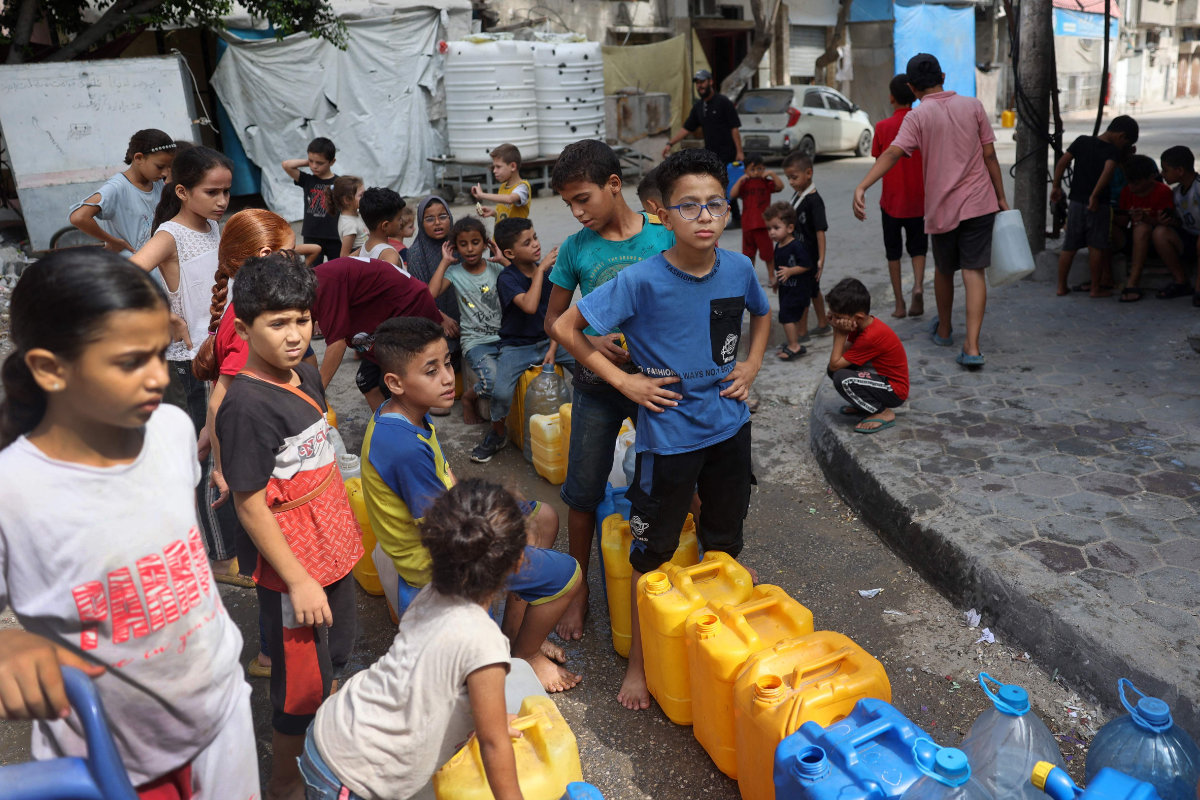
Palestinian children queue at a water distribution point in the Bureij refugee camp in central Gaza Strip on August 25, 2024, amid the ongoing conflict between Israel and the Palestinian Hamas militant group. (AFP)
These horrors are all the more terrifying for the thousands of children separated from their caregivers and forced to fend for themselves.
“Children who have lost or been separated from their families are facing unimaginable hardships as they struggle to survive without adult care,” Ahmad Baroudi, media manager for Save the Children’s office in the Occupied Palestinian Territories, told Arab News.
INNUMBERS
• 19,000+ Have lost one or both parents.
* 16,480+ Killed in the conflict since Oct. 7.
Sources: UN/MoH/Save the Children
“In many cases, older siblings or extended family members are stepping in to provide what little support they can, often in the most desperate conditions. However, these children are extremely vulnerable to exploitation, abuse, and neglect, as well as the severe psychological trauma of being alone in such a hostile environment.”
Although humanitarian organizations “are working tirelessly to reach these children, offering emergency shelter, food, and psychosocial support,” Baroudi said the scale of need “far outstrips the resources available.
“The situation is dire, and without immediate and sustained intervention, the survival of these children remains at grave risk.”
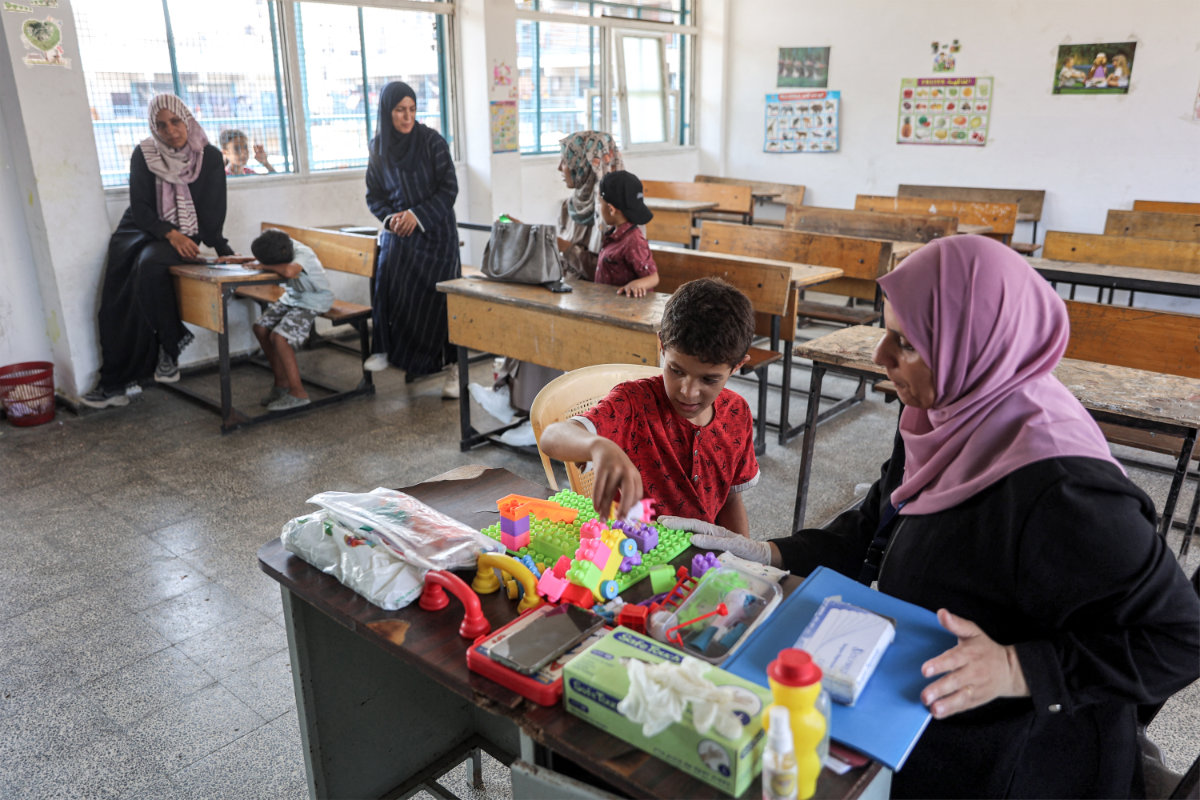
Shereen al-Bozom, a Palestinian speech therapist who launched an initiative to treat children suffering from conflict-induced trauma and speech impediments, treats a child at her makeshift clinic in a classroom of the Fakhura school in Gaza Strip on Aug. 14, 2024. (AFP)
There are also many unaccompanied minors held in Israeli jails. The Palestinian Commission for Detainees and Ex-Detainees Affairs reports that Israel has detained an unknown number of children from Gaza since Oct. 7, in addition to more than 650 arrested in the West Bank.
Released child detainees say they have been subjected to different methods of torture, including physical and sexual abuse, strip searches, and cruel treatment, like being made to stand in the heat for extended periods, according to Save the Children.
“Torture, cruel or inhuman treatment of children is strictly prohibited under international law,” the charity said in a July statement.
In June, the UN added Israel to its global list of states and armed groups involved in “the killing and maiming of children, rape and other forms of sexual violence perpetrated against children, attacks on schools, hospitals and protected persons.”
Palestinian militant groups Hamas and Islamic Jihad were also added to the list.
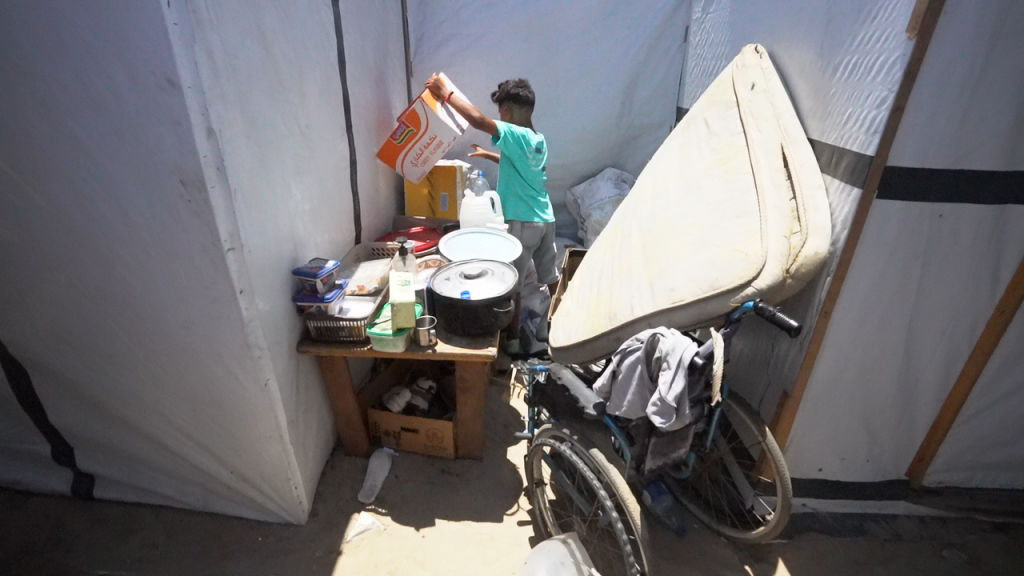
An injured child is seen at the 'Orphan City' camp established by a charity organization for Palestinian children who lost their entire families as a result of the Israeli army's attacks on July 09, 2024 in Khan Yunis, Gaza. (Anadolu via Getty Images)
The US-based International Rescue Committee said last week it was concerned that the actual number of unaccompanied minors in Gaza was far higher than current UN estimates.
A UN survey in April found that since Oct. 7, some 41 percent of families in Gaza had been caring for children who were not their own.
While nongovernmental organizations are providing critical services such as food distribution, healthcare, and psychosocial support to minors, Save the Children’s Baroudi said “the scale of the crisis means that many are left without the help they desperately need.
“The limited resources and barriers to access mean that only a fraction of the suffering can be alleviated at this time, leaving countless people, especially children, in life-threatening situations.”
International humanitarian and human rights organizations, along with several governments, have repeatedly called for an immediate and permanent ceasefire in Gaza and the release of all hostages.

If a permanent ceasefire is reached soon, Baroudi believes “the future of the orphans who survive will depend on the international community’s commitment to long-term support and reconstruction efforts.
“These children will need comprehensive care that goes beyond immediate survival needs,” he said. “This includes safe and stable housing, continued access to education, healthcare, and mental health services to help them recover from the profound trauma they have endured.”

He added: “Efforts will need to be made to reunite them with any surviving family members or to place them in protective environments where they can receive the care and support they need to rebuild their lives.
“Without sustained international support, these orphans risk falling through the cracks, facing a lifetime of instability and vulnerability.”
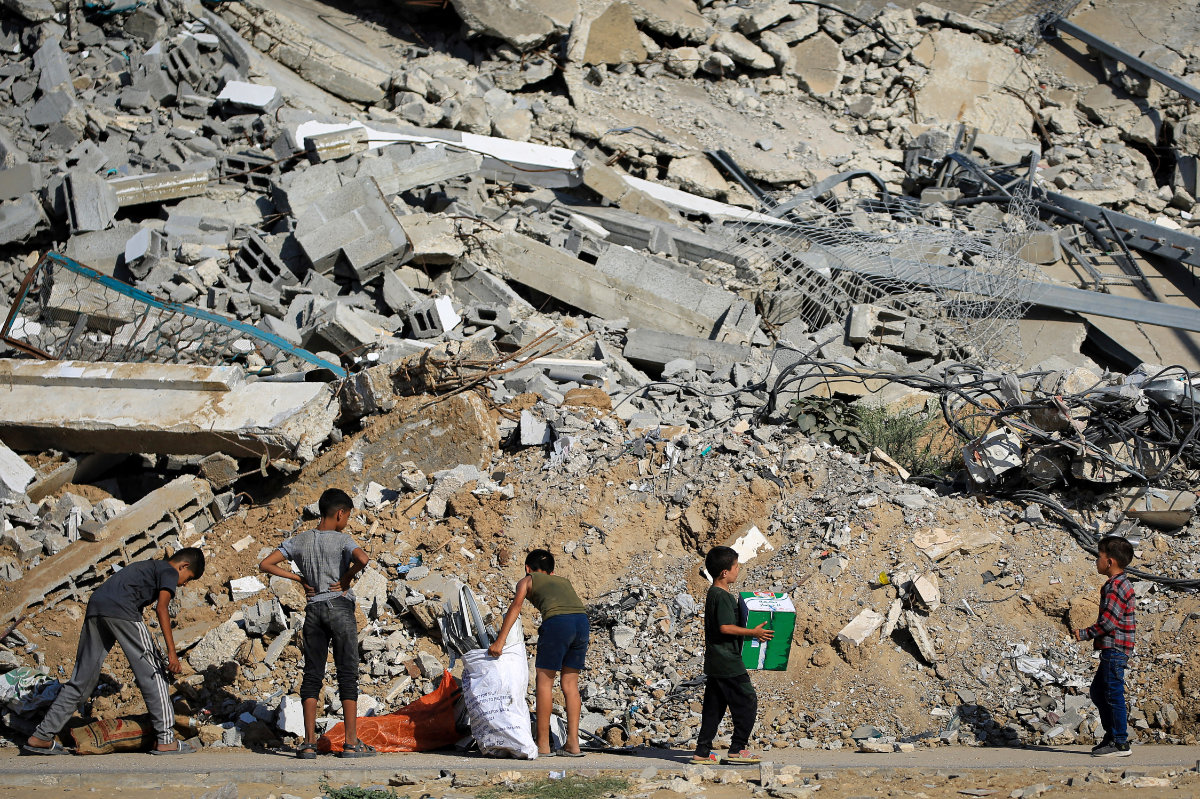
Children look for salvageable items in the rubble of buildings destroyed during Israeli bombardment al-Bureij refugee camp in the central Gaza Strip on June 24, 2024. (AFP)
Sahar Alhabaj, an occupational therapist at a UK mental health facility, said that unaccompanied and orphaned children in Gaza “are suffering from loneliness, emotional deprivation, and lack of care due to the absence of their families.”
These emotional challenges are aggravated by “their inability to understand deep concepts like death and comprehend the emotions associated with this concept, such as sadness and fear,” she told Arab News.
While those children may be “physically safe” once a permanent ceasefire is reached, Alhabaj said “they might suffer from long-term traumatic stress or personality disorders.”
Audrey McMahon, a child psychiatrist with Medecins Sans Frontieres, warned in June that the “entire population of children and teenagers in Gaza — more than 1 million people — will need mental health support” once the war ends.
After seeing firsthand the impact of the war on children, she told MSF: “In Palestine, there’s never a ‘post’ in post-traumatic stress syndrome. It’s ongoing trauma, it’s protracted trauma, it’s one war after the other.”
She added: “These children are human beings that have the same right to have a life lived in peace, to have access to good food, to grow healthy. They should have a right to have dreams and hope for the future.
“Children are born where they’re born, and it doesn’t make them belong to any type of group. They are just children.”



